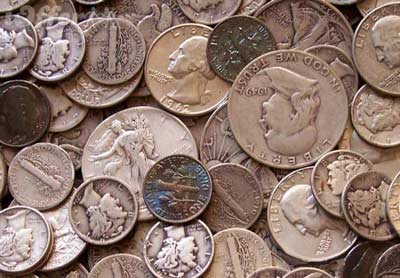GDP Shows Surprise Drop for US in Fourth Quarter
AP
Published: Wednesday, 30 Jan 2013 | 8:11 AM ET
The U.S. economy posted a stunning drop of 0.1 percent in the fourth quarter, defying expectations for slow growth and possibly providing incentive for more Federal Reserve stimulus.
The economy shrank from October through December for the first time since the recession ended, hurt by the biggest cut in defense spending in 40 years, fewer exports and sluggish growth in company stockpiles.
The Commerce Department said Wednesday that the economy contracted at an annual rate of 0.1 percent in the fourth quarter. That's a sharp slowdown from the 3.1 percent growth rate in the July-September quarter.
The surprise contraction could raise fears about the economy's ability to handle tax increases that took effect in January and looming spending cuts.
[No kidding? I could swear it was only yesterday that the President assured us that by asking the rich to pay "their fair share" of taxes, the economy would flourish and our debt problem would drift away.]
Still, the weakness may be because of one-time factors. Government spending cuts and slower inventory growth subtracted a total of 2.6 percentage points from growth.
[Yes, the propaganda masters at AP would love for us to believe that government spending cuts "caused" a decline in GDP...After all, the President says we can't cut spending or we will risk America's "recovery". But did the US Government really cut spending in the 4th qtr?
[...in Q4, the US added some $312 billion in debt. And more to the point, the US government spent a grand total of $907.9 billion in the same quarter. This compares to $877.1 billion a quarter earlier: $30 billion less.]
And those volatile categories offset faster growth in consumer spending, business investment and housing -- the economy's core drivers of growth.
Another positive aspect of the report: For all of 2012, the economy expanded 2.2 percent, better than 2011's growth of 1.8 percent.
[So, as I see it, The US added $1.2 TRILLION in new debt in 2012 and got a +0.4% increase in annual GDP? Well, at least "the market is up"!]
[So, as I see it, The US added $1.2 TRILLION in new debt in 2012 and got a +0.4% increase in annual GDP? Well, at least "the market is up"!]
The economy may stay weak at the start of the year because Americans are coming to grips with an increase in Social Security taxes that has left them with less take-home pay.
[May stay week at the start of the year? That's wishful thinking! Unless their "less take home" pay is temporary, it would be difficult to see the economy gaining much strength anytime soon. But, at least "the market is up"!
Subpar growth has held back hiring. The economy has created about 150,000 jobs a month, on average, for the past two years. That's barely enough to reduce the unemployment rate, which has been 7.8 percent for the past two months.
Economists forecast that unemployment stayed at the still-high rate again this month. The government releases the January jobs report Friday.
[Are these the same economists that forecast 4th qtr GDP would be +1.1%?]
The slower growth in stockpiles comes after a big jump in the third quarter. Companies frequently cut back on inventories if they anticipate a slowdown in sales. Slower inventory growth means factories likely produced less.
Heavy equipment maker Caterpillar, Inc. said this week that it reduced its inventories by $2 billion in the fourth quarter as global sales declined from a year earlier.
The biggest question going forward is how consumers react to the expiration of a Social Security tax cut. Congress and the White House allowed the temporary tax cut to expire in January, but reached a deal to keep income taxes from rising on most Americans.
[Unless of course you were part of the 77% of Americans whose taxes rose when the Social Security tax cut expired. Buy hey, at least "the market is up"!
The tax increase will lower take home pay this year by about 2 percent. That means a household earning $50,000 a year will have about $1,000 less to spend. A household with two high-paid workers will have up to $4,500 less.
[And everybody knows, thanks to AP and the other mainstream news media propaganda masters, that a decrease in incomes will only cause a "temporary" set back to the economy at the start of the year. C'mon, EVERYBODY knows it will get better in the second half of the year. We've been promised that every first half of the year since 2008. We can be certain then that "the market" will be up!]
Already, a key measure of consumer confidence plummeted this month after Americans noticed the reduction in their paychecks, the Conference Board reported Tuesday.
[Shhhh, consumer confidence plummeted? You'll ruin everything! No wonder this is in the second to last paragraph of this puff piece...]
Economists expected the first reading on gross domestic product to show growth of 1 percent, down from the third quarter's reading of 3.1 percent.
___________________________
Why This Is 'Best-Looking' GDP Drop You'll Ever See
 By Jeff Cox | CNBC
By Jeff Cox | CNBC
Negative economic growth in the fourth quarter provided a scary headline to start Wednesday's trading but probably little else in market impact.
In the best light, the headline drop of 0.1 percent in gross domestic product masked stronger internals regarding consumer and business spending as well as progress in the housing recovery.
(Read More: GDP Shows Surprise Drop for US in Fourth Quarter)
At its worst, the bad news merely provides more cover for aFederal Reserve intent on churning out stimulus until it determines the economy can survive on its own.
"I don't think this negative number is going to have much legs," said Jim Paulsen, chief market strategist at Wells Capital Management in Minneapolis.
The darker scenario, in fact, is actually bullish for stocks, which have ridden the wave of $3 trillion in central bank liquidity to eclipse five-year highs and push towards a new record.
Fed Chairman Ben Bernanke "has to keep the economy high as a kite. He has to make sure we don't sober up and realize how screwed up we are," said Peter Schiff, founder and CEO at Euro Pacific Capital in New York. "We don't have a real recovery. It's an illusion, it's a drug-induced high. The minute you take away the drugs we come down. We can't stop easing, ever."
______________________
[Appropriately 1978, at the height of the last inflationary fiscal fiasco courtesy of the US Federal Reserve]
___________________________
___________________________
US Ends 2012 With 103.8% Debt To GDP
Submitted by Tyler Durden on 01/30/2013 - 09:38
Previously, when calculating debt/GDP metrics for the US, we naturally assumed some GDP growth in Q4. Following today's GDP data we now know what Q4 GDP is. We also know that, at least on a preliminary basis, it posted a decline on an annualized basis. This means that we now have an official print for US Debt/GDP as of December 31, 2012. The numerator, or debt: $16.432 trillion, or the debt ceiling, which as we know was breached on the same day, and which has yet to be formally raised. The denominator, or GDP: $15.829 trillion. This means that the formal debt/GDP is now 103.8% and growing fast.
___________________________
Santelli Blasts Bernanke: "Whatever You're Doing, It Isn't Working"
Submitted by Tyler Durden on 01/30/2013 - 15:35
While some would look at the surge in government spending in Q3 last year (ahead of the election) and subsequent plunge in Q4 as conspiratorial, CNBC's Rick Santelli takes a step slightly further back as he draws the analogy between the mystical monetary experimentation of Ben Bernanke and his horde of central bank cronies and the"bloodletting of leeching" of medieval medicine providers. The point being that if you were sick in the middle ages, leeches were applied; and if you returned weeks later (still sick), more leeches and blood-letting took place - with no lesson learned. The fact that we borrowed $300bn in Q4 and managed a dismally dire drop in GDP growth offers little hope as the world glares agog at the Dow Jones Industrial Average index while Bernanke, six years on from the start of the recession continues to apply the same medicine that has done nothing to resurrect our economy. In Rick's words, "Whatever you're doing; It isn't working!" and in fact the monetary support could potentially hurt the economy in the medium-term as debt piles up exponentially. An epic rant...










